
Radio Frequency Identification Devices
Community Informational Forum & Public Hearing
|
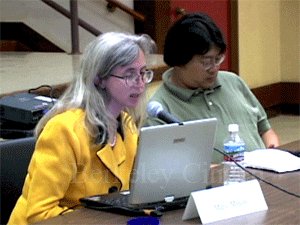 |
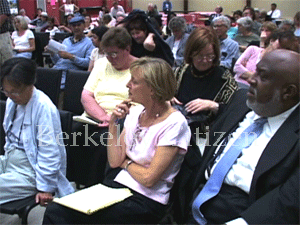 |
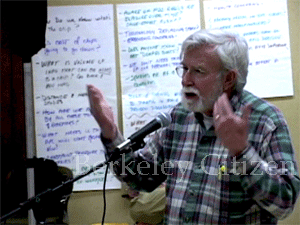 |
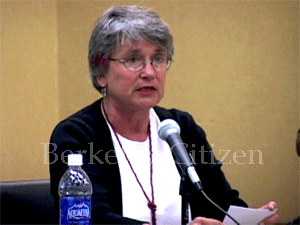 |
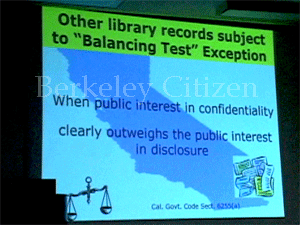 |
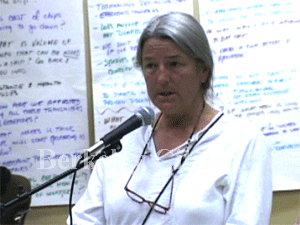 |
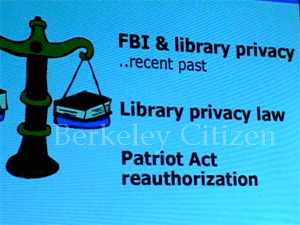 |
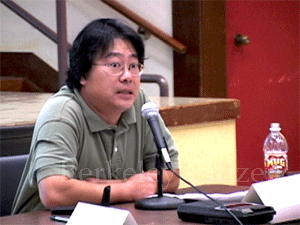 |
 |
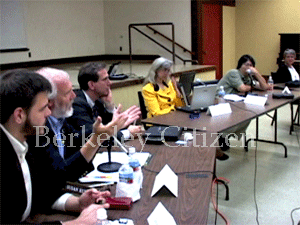 |
 |
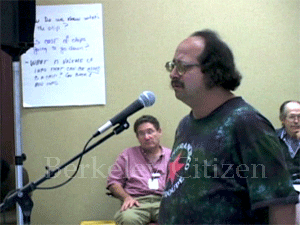 |
 |
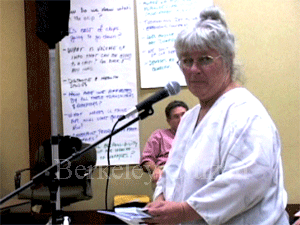 |
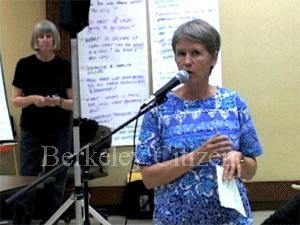 |
| Berkeley Board of Library Trustees Community Meetings - Berkeley Citizen |
|
Radio Frequency Identification Devices
Press Articles:
- "Library Workers, Patrons Denounce
RFID System" by staff writer Matthew Artz
Berkeley Daily Planet Weekend Edition August 5-8, 2005 - "Industry;s Gain, Library's Pain" by Peter Warfield and Lee Tien
Berkeley Daily Planet Weekend Edition May 10-12, 2005 - "RFID Should Be Canceled Immediately",
by Peter Warfield and Lee Tien
Berkeley Daily Planet Weekend Edition March 4 -7, 2005 - Library User Blames Director for Problems by Rosemary Vimont
Berkeley Daily Planet Tuesday April 26, 2005 - Library Director Griffin Receives Jeers at Board Meeting By Matthew Artz,
Berkeley Daily Planet April 29, 2005 - Longtime Berkeley Activist Looks To Take on Library Controversies By Matthew Artz
Berkeley Daily Planet March 22, 2005 - "San Francisco Rejects RFID" staff writer Matthew Artz
Berkeley Daily Planet Weekend Edition July 5-7, 2005 - "Library Bristles At Patriot Act" by Al Winslow, Special to the Planet
Berkeley Daily Planet Weekend Edition August 9, 2005 - "Battle Rages Over
Library System's Future" by Al Winslow, Special to the Planet
Berkeley Daily Planet Weekend Edition March 22-24, 2005 - "RFID: Many Problems, Little Public
Discussion" by Peter Warfield and Lee Tien
Berkeley Daily Planet Weekend Edition April 8-11, 2005 - Library Is Silent on Radio Frequency ID System
By Peter Warfield, June 25, 2009
"Library Workers, Patrons Denounce RFID System" by staff writer Matthew Artz
Berkeley Daily Planet Weekend Edition August 5-8, 2005More than 100 people filled the South Berkeley Senior Center Monday to debate the Berkeley Public Library’s practice of placing radio frequency identification devices (RFIDs) in books. The library has already begun installing the $650,000 system, replacing bar codes on book covers with radio antennas. The forum, hosted by KQED’s Keven Guillory, featured dozens of library users and staff members who denounced the use of the devices.
The palm-sized RFID tags hold the promise of allowing patrons to check out all their materials at once by swiping the pile of books over an electronic reader. By increasing self check-out, library management believes it can boost staff efficiency and dedicate more time to serving patrons away from checkout lines. But some opponents charge that as scanners become more powerful and widespread, the technology will allow authorities to trace not just books, but library patrons as well. Others said they worried that the low level radio frequencies emitted by the tags might cause cancer.
The union representing library workers came out Monday in opposition to the technology. In a memo from SEIU Local 535, the workers argued that the system might create more work for librarians, risk worker health, and possibly eliminate jobs. Every member of the public who spoke Monday opposed the technology.
The library approved the system last year, and RFID checkout stations have already debuted at some branches.
The system is not fully implemented, and during Monday’s forum Paul Simon of Checkpoint Systems, the library’s New Jersey-based vendor, acknowledged equipment failure at the Claremont Branch. Library Board Trustee Terry Powell said the library will continue implementing RFID, but wouldn’t shut the door on dismantling it even though the vendor has already been paid. “We’re still looking at the issues,” she said.
Local opposition to RFID was minuscule when the library board unanimously approved it two years ago. But opposition has swelled this year as privacy advocates like the American Civil Liberties Union and the Electronic Frontier Foundation urged the city to reject RFIDs and a public feud between library workers and Director Jackie Griffin brought the issue to the forefront.
RFIDs emit a low-range radio frequency that can be picked up by a specially designed scanner. The scanner can only read the code for the library material. To connect the code to the actual book title, the code would have to be cross-referenced with the library’s catalogue.
While the system doesn’t pose much of a privacy risk now, Lee Tien of the Electronic Frontier Foundation warned government and business interests were pushing the technology and that over time scanners will likely be installed in convenience stores, malls, and airports, making the library book code a valuable piece of information for authorities trying to track citizens.
“Big money wants to sell RFID chips to manage information...And the government wants that information, too,” he said. Tien’s group helped stop the installation of RFIDs in the San Francisco Public Library. Currently they are fighting to keep RFIDs out of U.S. passports and state identification cards.
David Mulnar, a UC graduate student who has researched privacy concerns relating to RFID and worked with the library, said Berkeley has so far avoided mistakes made in other communities. For instance at the Cesar Chavez branch library in Oakland, the RFID code was merely the inverse of the bar code, which would make it easier for authorities to figure out materials checked out by library patrons.
Simon acknowledged that there were privacy concerns with RFID, but said that library users need not worry that their reading materials might be uncovered by interlopers lurking with RFID readers.
A six-foot antenna (which costs approximately $1,000) is required to read a Berkeley library RFID chip from three feet away, he said. Addressing audience concerns, he said Checkpoint RFID tags did not contain memory for additional information besides the book code and contained no heavy metals. Simon also insisted that Checkpoint was in sound fiscal health and would not go out of business, leaving the city stuck with no one to service the technology.
City Councilmember Gordon Wozniak, a retired physicist formerly with Lawrence Berkeley National Lab, battled audience members over whether the chips presented a health risk. Wozniak said RFIDs emit a safe frequency that is higher than AM radio, but lower than FM radio.
“We’ve been exposed to these frequencies for a long time,” he said, adding that recent studies showed no links between exposures to the radio waves and health risks. Audience members questioned whether the cumulative impact of radio waves might be connected to rising cancer rates.
Almost as controversial as the technology was the composition of the panel. Scheduling conflicts kept a representative of the ACLU from attending. That left the first panel with Simon from vendor Checkpoint Systems, Wozniak, an RFID supporter, and Mulnar.
Councilmember Kriss Worthington demanded another public forum with a more balanced panel.
“How many people think this was an equal amount of passion from both sides?” he asked the audience. After the meeting Councilmember Darryl Moore, who also sits on the library’s board or trustees, accused Worthington of grandstanding.
“To besmirch the board [by saying] that we didn’t make it balanced is unfair,” he said.
As has become commonplace at library meetings, Griffin, the library’s director, was singled out for attack by a feisty audience angry that the public forum on RFID came after its implementation.
“You came in here and got some cabal to do this and didn’t even tell people about it...How do I take you to court? How do I make you give us our democracy back?” said Nancy Delaney of Berkeleyans Organizing For Library Defense (BOLD), an anti-RFID group. Griffin did not speak during the meeting.
When Delaney’s comments were greeted with cheers, library Trustee Ying Lee rose to Griffin’s defense, but failed to quiet the crowd. “Personally I’m extremely uncomfortable when a large number of people attack a single person with a different point of view,” she said. “They need to respect our point of view,” said a man in the audience. “You’re backing [Griffin],” another audience member yelled. Seconds later several shouts of “Bullshit” rang out in the senior center from critics of Griffin.
"Industry;s Gain, Library's Pain" by Peter Warfield and Lee Tien
Berkeley Daily Planet Weekend Edition May 10-12 2005When opponents of library use of radio-frequency identification (RFID) technology testified at Berkeley’s Peace and Justice Commission meeting in March, 2005, one of the commissioners repeatedly asked whether the industry was using this library in particular, or libraries in general, to promote RFID. A letter sent by a major book industry group to members of San Francisco’s Board of Supervisors last summer shows that the answer is a resounding yes.
Worse yet, the book industry group wants to use libraries as guinea pigs to test RFID.Immature Technology
While acknowledging that RFID “is still an immature technology, lacking in essential capability and standards,” the letter’s author, James Lichtenberg, board member of the Book Industry Study Group (BISG) and chair of its New Technology Committee, nevertheless urged funding of RFID at San Francisco Public Library (SFPL) so that libraries can “make a contribution to maintaining our free and open society as we embrace new and untested technologies.”Civil Liberties at Risk
Chillingly, the letter’s fundamental argument for why libraries and library patrons should become RFID guinea pigs is that industry will not act responsibly: “for libraries to abandon the field now would leave the development of RFID essentially in the hands of commercial and defense interests where ‘national security’ and the profit motive often overshadow concerns for civil liberty.”
Indeed, Lichtenberg warns that the future of RFID technology may well lead to “ubiquitous ignoble use of RFID for surveillance and invasion of citizens’ rights.” In short, the letter says libraries should buy RFID because industry and government cannot be trusted to protect our privacy and civil liberties.Buy Now, Change Later.
Lichtenberg is right that industry and government want to use RFID for surveillance. But that’s precisely why it is sheer chutzpah for the commercial interests he represents to promote RFID by holding out the false hope that libraries, by buying RFID systems today, “ultimately will make the technology itself stronger and safer as it matures and its implementation broadens.”
The truth is, libraries would lose any leverage they might have by buying RFID now and seeking changes afterwards. Once libraries have bought into RFID, why should industry change its ways? Rather than changing the RFID product, it is far more likely that the book industry wants to use the good will of libraries to put a friendly face on RFID, in order to make RFID technology more palatable to the public. After all, the BISG letter provides no specifics about how libraries that make the expensive plunge into RFID and convert their collections to its use would “be leaders in the exploration of RFID use”—or about how libraries’ privacy concerns would affect the wealthy RFID or book industry and its products.
The New York-based BISG counts among its members “the entire publishing value chain,” including “authors, publishers, printers, distributors, technologists, consultants, retailers and of course libraries.” BISG officers include management officials of publishers Barnes and Noble, Random House, and John Wiley & Sons, according to the group’s website. Business hopes Lichtenberg’s letter is clear about the hoped-for benefits to the business interests he serves. It says, “RFID holds out a promise to create greater efficiency and significantly take cost out of any supply chain, ours included....”
Unfortunately, BISG has already significantly influenced policy at the American Library Association, which issued its “Resolution on Radio Frequency Identification (RFID) Technology and Privacy Principles” in January 2005 with repeated, explicit references to BISG—and an endorsement of BISG’s inadequate “Privacy Principles” statement. Carrot and Stick Lichtenberg’s letter reveals corporate interests are using a carrot-and-stick approach to sell “untested” RFID technology to government and library decision makers. The stick is the thinly veiled, very real threat that RFID will usher in an age of ubiquitous surveillance in the near, if not immediate, future. The carrot is the vain hope that libraries can save society from that dystopian future.
Libraries and library users should not let themselves become test subjects for this “immature” technology—especially when they must pay heavily for the privilege and cannot easily escape once they sign up. Who listens to guinea pigs, anyway?
Peter Warfield is executive director and co-founder of the Library Users Association. Lee Tien is a senior staff attorney for the Electronic Frontier Foundation and a long-time Berkeley resident.
"RFID Should Be Canceled Immediately", by Peter Warfield and Lee Tien
Berkeley Daily Planet Weekend Edition March 4 -7, 2005Berkeley is becoming the poster child for the Brave New World of radio frequency identification (RFID) tracking tags in library materials, and helping to legitimize a potential billion-dollar RFID industry—unless citizens take action to stop it. A piece in the jigsaw puzzle of the surveillance society is now being installed at public expense at the Berkeley Public Library—with little public discussion beforehand and a library administration selling it with information that is incomplete, misleading, and at times simply wrong.
In late December 2004, Library Users Association and the Electronic Frontier Foundation (EFF) jointly requested documents from the library about the costs and benefits of RFID. In particular, we wanted to examine the library’s repeated claims that repetitive stress injuries (RSI) have cost the library significant amounts of money and that RFID would cut those costs. While the library responded to our request with less information than we expected, the documents that we did receive tell a markedly different story than that presented by the library administration.
What the library trustees were told: In December 2003, Board of Library Trustees (BOLT) President Laura Anderson asked if the RFID system “would result in savings.” Library director Jackie Griffin responded that “the library spent about $1 million in direct costs for workers’ compensation claims for the past five years, mostly due to repetitive motion injuries. This technology should result in a significant decrease in injuries and associated costs.” (BOLT Minutes, Dec. 10, 2003)
What the documents show: The documents provided by the library do not support the library director’s response.
1. For the five years ending June 30, 2003, the library spent $642,161 on all workers’ compensation claims. All RSI-related claims totaled $167,871, just 26 percent of the five-year total.
2. In the five-year period 1995-2000, the library spent $1,079,807 on all workers’ compensation claims—but just $4,009 on RSI claims, or less than 1 percent of the total.
3. In the seven-year period 1998-2004, RSI claims accounted for 19 percent of the library’s workers’ compensation costs ($167,871 out of $894,067).
4. Since 2001, the library’s total worker’s compensation claims and its RSI claims have declined steadily. Indeed, for fiscal year 2004 the library spent only $10,548 on workers’ compensation claims and zero on RSI claims.Simply put, the documents we received from the library contradict the library’s claims that RSI is a major financial burden. Nor do the documents support the library’s claim that the new RFID system will significantly decrease RSI injuries. The logic here is that using RFID will eliminate repetitive motions associated with using bar code scanners to check books in and out. But we see no evidence that the library’s RSI injuries were caused by bar code scanners, which have been used for years. There were no RSI claims in 1998, 2000, and 2004, and only one RSI claim worth $1,008 in 1999.
Even if all of the library’s RSI problems were caused by bar code scanners, the savings afforded by an RFID system costing at least $643,000 (for which the library took out a $500,000 loan costing $52,360 in interest over five years) are minimal at best. Moreover, the library has never explained why other, cheaper mitigating measures, such as rotating employees more often between tasks, are inadequate.
Reassurances from the library administration and BOLT President Laura Anderson (Daily Planet, Feb. 25) that RFID poses no privacy threat are as unsupported as library claims about RSI. Unlike bar codes, RFID tags can be read secretly through clothing, book bags or briefcases by anyone with the appropriate reader device. There are various ways to associate a book title and bar code, both with AND WITHOUT access to the library’s database. Furthermore, tracking where you go with a tagged item requires only the ability to read its tag. Therefore, retailers, individuals, and government agencies armed with RFID portable or doorway scanners will have the potential to figure out what you are reading, where you go with the material, and when.
To some, this may sound like science fiction, and we hope it stays that way. But every month we read about some new high-tech method for invading privacy, while our current reliance on massive computerized databases of personal information has brought us an epidemic of identity theft and data “spills.” The lesson? The surveillance society will not be built in a day by evil people. It will be built because we accept privacy-invading technologies for supposed short-term convenience, ignoring the long-term social costs.
Have no doubt about it: the soul of the public library as an open forum for ideas and information, free from the threat of spying and potential chilling effects, is under attack from the RFID implementation happening now at the library. Berkeley should not spend its library dollars on a technology that Big Brother would love. This implementation should end, now.
Peter Warfield is executive director and co-founder of Library Users Association. Lee Tien is a senior staff attorney for the Electronic Frontier Foundation and a long-time Berkeley resident."San Francisco Rejects RFID" staff writer Matthew Artz
Berkeley Daily Planet Weekend Edition July 5-7, 2005The controversial radio devices coming to Berkeley this August won’t be arriving in San Francisco anytime soon.
The San Francisco Board of Supervisors Budget Committee voted 4-1 Thursday to reject the library’s request for $680,000 to begin phasing in the technology.
With two anti-RFID supervisors not on the committee, RFID opponents appear to have a majority of the 11-member board of supervisors. “This vote will have far reaching implications,” said Peter Warfield of the anti-RFID Library Users Association. “I think the more people learn about RFID the more they understand how bad it really is.”
RFID is a hi-tech alternative to the traditional library bar code. Instead of a code, RFID’s are palm sized radio antennas that emit a frequency read by specially designed machines.
The technology, used in numerous types of industries, is advertised to boost self check-out rates at libraries to 90 percent, thereby freeing staff to perform other jobs. But privacy advocates, including the American Civil Liberties Union and the Electronic Frontier Foundation, fear the devices could ultimately be used to track library patrons rather than books."Library Bristles At Patriot Act" by Al Winslow, Special to the Planet
Berkeley Daily Planet Weekend Edition August 9, 2005Each night, the computer at Berkeley's downtown library erases everything that happened that day on its 50 Internet terminals. Titles of several thousand or so books returned that day disappear from the borrower's record. Once a month, the names of anyone who took out a particular book, whether "Winnie the Pooh" or "Das Capital," vanish as well.
Regular record-purging is part of the library's defiance of the supposedly anti-terrorist U.S. Patriot Act, which lets the FBI and other agencies freely investigate the reading habits of library users. The FBI sent a speaker to a library panel discussion in February but so far hasn't asked to see any records, library director Jackie Griffin said in an interview this week. If they do, she said, "I would have to consult with the city attorney and decide, according to the circumstances, what to do.
“I don't want to spit in their eye, but if they serve me with a subpoena, I certainly have the support of my board of directors, my staff and the city, not to honor it," Griffin said. Resistance to the Patriot Act — which opponents say does more damage to civil liberties than it does to terrorists — has been increasing.
A survey of 1,500 libraries completed in February by the University of Illinois, reported that 444 had been approached for information by the FBI or other agencies. Some 219 libraries cooperated and 225 refused, the survey said.
Nationwide, 91 communities, including Berkeley, have passed resolutions urging municipal employees and residents not to cooperate with government inquiries that violate civil liberties. Similar resolutions have been passed in Oakland, Albany, El Cerrito, Richmond, San Francisco and Mill Valley. Some 83 congressmen, including Rep. Barbara Lee (D-9th District), now are cosponsoring the Freedom to Read Protection Act, introduced in March by Rep. Bernie Sanders (D-Vt.)
Sen. Orrin Hatch, (R-Utah), the Patriot Act's staunchest supporter, recently withdrew a measure that would make the act permanent. It is now due to expire in 2005. Running 342 pages and titled the "Uniting and Strengthening America by Providing Appropriate Tools Required to Intercept and Obstruct Terrorism Act", the Patriot Act was passed by Congress Oct. 25, 2001, six weeks after the attack on the World Trade Center.
It passed the House 357 to 66 with nine not voting. Rep. Lee voted against it. It passed the Senate 96 to one with three not voting. Sens. Barbara Boxer and Diane Feinstein voted for it. Sen. Russell Feingold (D-Wisc.) cast the only "no" vote.
The act expands existing government surveillance powers by removing certain Constitutional restraints. One provision allows the government to secretly arrest non-citizens and hold them indefinitely without charge or access to an attorney. In the case of libraries, it doesn't require "probable cause" or a specific reason to ask to see records but permits generalized searches. It makes it a crime for librarians to report such searches.
Berkeley civil liberties lawyer Jim Chanin said, "They can get anyone who ever used any library book and the library is prohibited under criminal sanctions from telling anyone about it. If that's not a definition of a police state, then I don't know what is," said Chanin, who is past president and a current board member of the Berkeley-Albany-Richmond-Kensington Chapter of the American Civil Liberties Union.
Other opponents, such as the Bill of Rights Defense Committee say that even if no records are actually searched, the threat has a chilling effect. Bowman Enrie regularly uses the library though he doesn't have a library card. He said the government "should mind its own business and get a clue."
Sylvia Salgado came out of the library with a sack full of books. "Yes, I would care if they looked at my records. I came here from Colombia 28 years ago. There they can do anything — stop you when they want, search you when they want. "Now, it’s getting like that here.”2005"Battle Rages Over Library System's Future" by Al Winslow, Special to the Planet
Berkeley Daily Planet Weekend Edition March 22-24, 2005Gene Bernardi of Berkeleyans Organized for Library Defense said she was collecting signatures against automation of the library’s main branch in front of the main doors recently when she was ordered away from the library.
According to Bernardi—whose account was confirmed by the ABC Security guard involved—the guard came out and said she was on “library property” and would have to move to the sidewalk. Bernardi refused and the guard threatened to call the police. A police car did arrive but Bernardi had relocated to the sidewalk.
Two weeks ago, the Peace and Justice Commission declined to condemn the small radio tracking devices being installed in all the libraries materials. Lee Tien, staff attorney for the Electronic Frontier Foundation, a San Francisco-based watchdog group, told the commission that the devices now in Berkeley’s library books are similar to those that government spy agencies intend to use for long-range tracking, placing them, for example, in visas carried around by foreign visitors. “This is a technology that could usher in an age of surveillance,” Tien said.
Mark Marrow, library general services manager, told the commission that the devices as installed can only track a book a few feet as it goes through a checkout reader. A resolution against the devices failed to pass with five yes votes, five no votes, one abstention, and three absences.
Library employees have complained about a variety of issues at the library, including the automation check out system, proposed layoffs and sagging employee spirits.
“In 34 years…I’ve never seen morale so low or the staff so angry,” said library employee Anne-Marie Miller told the trustees. Reference librarian Andrea Moss told Library Director Jackie Griffin, “We don’t know how to have a conversation with you and we need to.”
While the debate continues, library employees are pasting the tracking tags on the library’s books, videos, compact discs, records and tapes.
Joseph Alvarez, a library aide for seven years, said Griffin announced at a recent staff meeting that 200,000 of the library’s estimated 500,000 books and other materials have been tagged so far. Alvarez said a sense of depression pervades the staff at the main library downtown. “People are just beat and (management) contradicts itself in many ways,” he said. “First we’re told there are going to be layoffs and then we’re told there aren’t going to be.”
A common sight at the library is two employees checking out materials at the main desk while a line of waiting patrons stretches into an adjoining room. Alvarez said Griffin wants to automate the library “and you know who gets squeezed when that happens.”
Griffin was unavailable for comment for this article. According to the City Charter, the library director is answerable only to the five library trustees. The trustees are appointed by the City Council which can remove them only by a majority vote.
Bernardi was back at her post outside the library late last week. Not every one who signed her petition cared only about the tacking devices. “The petition should be to have the library stay open later and on Sunday,” said Rinaldo Pelegrino, who had a small child strapped to his side. He said the library is rarely open when a working parent has time to go there."RFID: Many Problems, Little Public Discussion" by Peter Warfield and Lee Tien
Berkeley Daily Planet Weekend Edition April 8-11, 2005Decisions about public libraries should be made publicly. But just as radio frequency identification (RFID) tags in library books can be secretly read and tracked, the Berkeley Public Library (BPL) installed RFID technology with little public awareness or discussion. Indeed, it appears that BPL did not tell the library’s governing body about known problems with RFID at other libraries before RFID was approved in April 2004. We think this gives the Board of Library Trustees (BOLT) ample reason to reconsider and reject RFID in Berkeley.
Our review of documents the library provided in response to our information request, and three years of BOLT agendas and minutes at www.ci.berkeley.ca.us/commissions/library, shows the following:1. RFID never appeared on any BOLT agenda for discussion or action in the three years before BOLT discussed and approved selection of the RFID vendor in March and April 2004.
2. The issue of RFID privacy concerns appeared only once in three years of minutes. No other problems of RFID were discussed, according to the minutes.
3. There is no evidence that BOLT was told about the potential health risks of RFID, which have been raised by the EMR Policy Institute, San Francisco Neighborhood Antenna Free Union (SNAFU), and others. By contrast, San Francisco’s Board of Supervisors took the potential health risks seriously in July 2004 when it refused to unconditionally fund RFID at San Francisco Public Library (SFPL) and instead required SFPL to come back in six months to explain how it would handle privacy threats and potential health risks.
4. There is no evidence that BOLT was told about RFID’s huge security weakness: that books can be taken from the library, undetected by the RFID system, if a person uses household aluminum foil to block the radio signal.
5. There is no evidence that BOLT was told about the ongoing costs of RFID-tags cost far more than bar codes and magnetic strips now in use, especially for certain non-book materials like CDs and videos. RFID Problems Elsewhere
The library documents we obtained also show that BPL staff researched other libraries’ experience with RFID and found a host of problems. The Eugene (Ore.) Public Library reported “collision” problems on very thin materials and on videos as well as “false readings” from the RFID security gates. (Collision problems mean that two or more tags are close enough to “cancel the signals,” according to an American Library Association publication, making them undetectable by the RFID checkout and security systems.)Many libraries reported problems with so-called “donut” RFID tags, which are flat labels with a hole in the middle for use on CDs. Three libraries said, “Donuts don’t work.” Another library said, “Many CDs have metal in them; this is a problem since RFID will not work.” Libraries also reported that donut tags did not stick to the CD and could not be read easily.
These problems with donut tags undermine one of the supposed benefits of RFID in libraries: that patron self-service check-out of CDs and videos will relieve staff of the need to remove the security cases often used with magnetic-strip security systems. Indeed, one library that implemented RFID reported that the self-service check-out rate declined from 20 percent to 15 percent—contrary to repeated claims that RFID implementation would dramatically increase self-service check-out rates.
BPL’s staff report described a multi-part problem with RFID tags at a Checkpoint Systems installation, writing that the library “is finding the metallic inks in book jackets to be a serious problem for checkout/checkin/security. Ironically, the book tagged for me in TS as a demo had metallic inks and would not self check out or set off the security gates....”
Some libraries criticized Checkpoint Systems, which is supplying Berkeley’s RFID system. One library noted, “Items added cannot be recognized by Checkpoint system for check-out/security until nightly synchronization between III [the library’s computer system] and Checkpoint.” Another library said, “Checkpoint system needs a totally separate server that must be synchronized at night. This is a bad idea.” A delay in matching the server’s records to the library’s own computer records could make it very hard to enforce borrowing limits that help make library materials available to more patrons. We have heard informally from staff that borrowing limits will not be enforced once RFID is implemented.
Did the Board of Library Trustees know about these problems? Unfortunately, the agendas and minutes do not show that RFID problems were presented or discussed in any meaningful way, or that the public had advance public notice that RFID was being considered. We therefore question the library administration’s claim that the decision to adopt RFID was a truly public process.
Finally, we note that the library’s contract with Checkpoint Systems can be canceled on 30 days’ notice for any reason or none, and with no penalty. Section 3.d. of the contract states: “If city terminates this contract for convenience before Contractor completes the services in Exhibit A, Contractor shall then be entitled to recover its costs expended up to that point plus a reasonable profit, but no other loss, cost, damage, expense or liability may be claimed, requested, or recovered.”
We think the library should cancel this RFID implementation and stick with a system that has worked well and cheaply for many years. The many issues associated with RFID—serious privacy threats, potential health risks, a big security hole, many technical problems, lack of interoperability among vendors, and potentially high operational costs—make the use of RFID at BPL a very bad idea.Library Is Silent on Radio Frequency ID System
By Peter Warfield, June 25, 2009Dr. Helen Caldicott, the noted author and world acclaimed anti-nuclear activist, will speak in Berkeley this Saturday, June 27, 2009, 7:30 p.m., at a benefit to support SuperBOLD (Berkeleyans Organizing for Library Defense) in its legal challenge of the City Council’s waiver of the Nuclear Free Berkeley Act (NFBA) for the Berkeley Public Library.
The waiver allowed the Berkeley Public Library to sign a contract with 3M Company for maintenance of its checkout system. 3M is a corporation that would not sign a standard city form for contractors that they are not now doing “work for nuclear weapons” and will not do so for the life of the contract. SuperBOLD contends that the City Council did not appropriately consider alternatives to the contract, as required by the NFBA.
Dr. Caldicott is the founder of Physicians for Social Responsibility, which won a Nobel Peace Prize, and was herself a nominee for the prize. The Smithsonian Institute named her one of the most influential women of the 20th century. She is the author of seven books, and will speak on “The Relevance of Nuclear Weapons and Nuclear Power to International Relations and the Green Revolution.”
SuperBOLD, and others, have some very serious issues with the library’s radio frequency identification (RFID) checkout system, but the library administration and the Board of Library Trustees (BOLT) appear determined to bury them in a pall of silence.
On June 10, BOLT held two meetings, a Budget Workshop and a regular meeting, and several members of the public raised concerns about important issues, primarily about the library’s privacy-threatening RFID checkout system. But neither the Trustees nor the library administration responded to the comments as they were made or in any discussions about the budget that followed.
Ying Lee, recent former BOLT member, made reference to the Commentaries of Peter Warfield and Gene Bernardi, saying she wanted to “recognize the work citizens have done” in revealing problems in the library’s RFID system. (See three articles by Bernardi and Warfield in the Berkeley Daily Planet, May 7 and May 14, 2009.) Lee said she recognized that RFID was problematic, but “didn’t track it systematically.” She said that RFID is “expensive” and “doesn’t work.” And, she said, there is “no evidence” of RFID reducing repetitive stress injuries (RSIs), as has been repeatedly stated as a reason for installing it. She also pointed out that “multiple [simultaneous] checkouts don’t work,” referencing another failed promise. “I don’t understand why we don’t have the barcode,” she concluded.
Phyllis Olin, who is President of the Western States Legal Foundation, an anti-nuclear organization, commented that she “second[s] what Ying has said.” “It’s time to stop throwing good money after bad,” Olin said, recommending that the library scrap the existing RFID system.
Gene Bernardi, member of SuperBOLD, presented a quotation from a vendor of self-service checkout systems, showing that a bar code self-checkout system, including a three-year maintenance contract, could be purchased for $164,431—less than the current two-year contract with 3M Company for maintenance only of the RFID system costing $168,915.
Phoebe Sorgen, a member of the Peace and Justice Commission, but speaking as an individual, asked the Trustees to prepare a detailed cost benefit analysis of continuation of the existing RFID checkout system as well as use of other vendors and other technology approaches, such as bar codes and magnetic strips as were previously used at the library.
Other members of the public also spoke about their objections to the library contracting with 3M Company.
Neither BOLT nor the library administration responded to these concerns at the time they were stated, or during budget discussions that followed. The only hint of action on RFID was that the budget for fiscal year 2009-10 and 2010-11 includes $30,000 for a consultant to “conduct research on the current options available in library security and materials handling systems.”
SuperBOLD has a special reason to be disappointed by the library’s silence and apparent inaction on RFID because the library director made a commitment in a meeting with SuperBOLD, its attorney Michael Lozeau, and the Acting City Attorney Zach Cowan. The agreement was memorialized in a May 11 letter to SuperBOLD’s attorney and signed by Mr. Cowan.
Cowan wrote: “As we discussed, I am writing this letter to confirm the following: Library staff are planning to present a report to the Board of Library Trustees (BOLT) in June concerning general approaches to eliminate any need to contract with the 3M Company for maintenance of the library’s RFID system. Library staff hopes—but of course cannot promise—that the BOLT will provide sufficient guidance at that time to enable the preparation of a request for proposals.”
Library staff as referenced in the letter means library management, but we saw no report on the agenda, nor was one mentioned at the June BOLT meeting. As of this writing, we are not aware of any additional BOLT meetings in June.
In other actions June 10, BOLT agreed to ask the City Council on June 23 to approve an increase in the Library Services Tax rate of 0.815 percent, based on the Bay Area Consumer Price Index. The library estimated it would receive “an increase in revenue of approximately $404,091 which is included in the fiscal year 2010 proposed budget.
Yet the library’s annual budget for books and materials is dropping precipitously, by $125,000 for the next two fiscal years, to $816,000. This represents a 13 percent drop from the current year, and almost 30 percent from the $1,123,442 materials budget two years ago in fiscal year 2007-08 as shown in California Library Statistics, which prints self-reported figures.
In another serious service reduction, approved in May, 2009, the library plans to eliminate inter-library loan (ILL) That will cut off library patrons’ traditional access to a world of tens of millions of books and other materials in more than 50,000 libraries that co-operatively share books and other materials for the benefit of their patrons. Berkeley also thereby ends its contributions to the system, impoverishing the co-operative library community as well. The LINK+ system is a poor substitute, drawing from only 50 libraries and placing patrons at risk of a huge $115 fee for lost or damaged books.
The event’s sponsoring organizations include Berkeley Women in Black, Central Committee for Conscientious Objectors, Code Pink, Committee to Minimize Toxic Waste, Ecumenical Peace Institute-N. Cal, Grandmothers for Peace, Gray Panthers of Berkeley, Green Party of Alameda county, Library Users Association, Middle East Children’s Alliance, Nuclear Information Resource Service, Social Justice Committee of Berkeley Fellowship of Unitarians, War Resistors League-West, Western States Legal Foundation, and Veterans for Peace Chapter 69.
The sooner we can put the library’s dysfunctional and maintenance-expensive RFID system and its contract with 3M Company behind us, by substituting a more reliable and less expensive bar code system, the more attention we can pay to the library’s core purposes—books and materials, and staff.
Peter Warfield is executive director of Library Users Association and a member of SuperBOLD.
COMMENTARY: Library User Blames Director for Problems
By ROSEMARY VIMONT
Tuesday April 26, 2005As a Berkeley homeowner for over 30 years and a life-long Berkeley Public Library user, I have been following the recent controversies surrounding the library and its director very closely. I’ve also been doing some thorough investigation in the matter.
Never in all my years have I witnessed such a debacle of community trust as is happening to our most cherished institution, the Public Library. From what I can assess, all blame must be brought to the feet of the director, Jackie Griffin. Furthermore, it is beyond me, considering the overwhelming PR disaster which the library faces, why the library’s board of trustees has not asked for Ms. Griffin’s resignation.
Here’s what we know of Ms. Griffin’s most egregious acts:
• Failed to actively campaign and persuade the voters to accept a library tax that would restore staff and operating hours.
• Managed to anger and alienate the majority of her employees.
• Allowed staff’s morale to “sink to an all-time low,” as one beleaguered employee was quoted.
• Has accepted some 20+ resignations or early retirements in the past three years.
• When faced with a budget crisis, her immediate proposal was to lay off 14 of the lowest paid and least benefited positions and where most of the library’s youth and diversity are found.
• At the same time, the director is retaining a $150,000-a-year salaried employee whose contract, (to oversee the move into the newly remodeled Central Building) expired a couple of years ago.
• The director pushed through a $650,000 radio frequency identification (RFID) self-checkout technology with very little if any public awareness or input.
• Dismissed and rejected employees’ budget saving suggestions as alternatives to layoffs.
• Has created an atmosphere of fear among the employees who may wish to speak out, while she is free to propagandize and have the last word in television and newspaper reports.
• Has contradicted herself several times with budget figures and presented conflicting accounts before the library’s board of trustees.
• Despite workers efforts to reduce repetitive stress injuries to zero in 2004, Ms. Griffin continues to use workers comp and repetitive stress injury dollars to justify the purchase of RFID.
• Has encouraged an aggressive book weeding with the dumping of some 20,000-plus volumes, while the shelves remain less than half full.
• Has made it clear that she wants more “popular materials” (ala Barnes & Noble) and that academic and/or esoteric titles can be gotten at the university libraries. Ms. Griffin seems indifferent to the intellectual capacity of the community, and to how difficult it is to get access to UC Berkeley’s book collection.
• Has allowed constant computer malfunctions since mid-February, and at one stretch tens of thousands of checkout transactions were lost.
• Has insisted on pushing through her layoff and reorganization plan (with many changes in job descriptions) without going through the process of Meet and Confer with the local union.
• She finally backed off the layoff plan when she magically found $300,000, and then announces it to the public as if she performed a benevolent miracle.
• Has allowed the library users’ morale to sink to all all-time low as well. In talking to dozens of library users, it’s evident that there is a frustration with too much unreliable technology (particularly voiced among seniors) in what should be the simple steps to searching, reserving and renewing books.
• Closed the Central Library on Sundays without polling the public as to which day would be the best to close, leaving many users angry, particularly families and the elderly.
• Finally, Ms. Griffin ignores the public by not responding to letters and phone calls as has been expressed in this paper and at Library Board of Trustees meetings.
I call upon every book-loving person in this town to attend the next Library Trustees meeting at the South Berkeley Senior Center Wed. April 27th at 6:45 p.m. (to put your name in for a chance to speak) and to demand the resignation of Jackie Griffin and call the Trustees to account for their complicity in the erosion of service and welfare of the library. It is OUR library. It should reflect OUR needs and values. And its director should conduct operations in a fair and transparent manner.
Rosemary Vimont is a Berkeley resident. ª
Library Director Griffin Receives Jeers at Board Meeting
By Matthew Artz, April 29, 2005In a scene resembling a high school pep rally more than a library board meeting, the Library Board of Trustees Wednesday remained far apart on a new budget and the public feud between some library employees and library director Jackie Griffin remained far from settled.
After repeated complaints that it was stifling the voices of library workers, the board granted employees two minutes apiece Tuesday to share their concerns.
With Board President Laura Anderson reluctant to maintain order, the crowded South Berkeley Senior Center turned into a boisterous peanut gallery. The audience, comprised mostly of library workers opposed to Griffin’s leadership and their community allies, cheered the roughly two dozen speakers that opposed Griffin and booed and hissed at the few workers who stood up to praise her.
When library employee Bob Saunderson credited Griffin for seeking to maximize efficiency and criticized the union for misrepresenting the facts, the boos were so unrelenting that Darryl Moore, the City Council’s representative on the board, asked if anyone had a gavel.
One quickly appeared, but when it was passed to Anderson, the board president, she declined to pick it up and let the boos continue.
Earlier, when library employee Sandra Schmitz credited Griffin for making long-needed technological innovations, a woman in the audience shouted for the board to dump the director, yelling, “Fire her.”
Afterwards, Moore noted the lack of order and said that he had contemplated walking out of the meeting.
The labor management rift at the library erupted after city voters rejected a library tax increase last November. With no new taxes to close what is now estimated as a $1.5 million deficit over the next two years, Griffin in January offered a reorganization plan that would have cost the jobs of about nine staffers, but no managers.
At the same time, the library was moving ahead with a controversial program to install radio devices (RFIDs) on books. Free speech advocates have criticized the devices, which will cost Berkeley $650,000, for potentially violating privacy rights. Meanwhile several employees have fought them on grounds that they are being used to reduce jobs. Griffin’s reorganization plan currently calls for eliminating the equivalent of 4.5 full-time positions.
The issue of technology was paramount at Wednesday’s meeting. Griffin’s supporters praised her for pushing through reforms that allowed customers to reserve books online, allowed librarians to order books electronically and allowed patrons to access to a greater variety of databases.
The director’s opponents questioned if new technologies, especially RFID, would work as promised or make their jobs easier.
Noting a recent computer breakdown at the library that meant some patrons were charged for books returned on time, Librarian Rachel Aronowitz asked, “How can I have faith in RFID?”
Griffin attributed the system breakdown to the library’s inability to fill two technology positions because of a city hiring freeze. She added that she expected to fill the positions when the new fiscal year began in July and add three more over the next two years.
Many of the employees said that a worker shortage had created a backlog of unshelved books and that Griffin was unresponsive to their concerns.
“Things are a disaster,” said Library Aide Aayan Gates-Williams. “There are materials all over the place.”
Claudia Morrow, a children’s librarian, questioned Griffin’s proposal to keep the library’s $150,000-a-year facility manager three years after the central library rehabilitation project has been completed.
“That’s 80 hours a week of library aide work that could turnaround the shelving backlog,” she said. “Thicker layers of unresponsive management are not the answer.”
When pressed on the subject of management jobs by Trustee Therese Powell, Griffin said that to reduce management during the roll-out of RFID and other new programs could put those programs at risk.
With nearly the entire three-hour meeting taken up by public comment, the board had little time to talk about the budget, which must be finalized by the end of June.
Beverly Marshall, the library’s new finance manager, offered some budget numbers, but said she was still working through the “convoluted, not understandable method of accounting from my predecessor.”
The board voted 4-1 to ask the City Council to raise the library tax 4.8 percent, equal to the rise in the Personal Income Growth Index this year. The board’s other option would have been to ask for a 1.56 percent tax increase equal to the rise in the Consumer Price Index. Under city law, the library can ask for the council for tax rates increases based only on those two indicators. Griffin has said the higher tax rate will net the library an extra $300,000 and help it avoid layoffs this year.
Trustee Powell, who cast the lone opposition vote, said that although she wants more funds for the library, she thought the 4.8 percent hike was contrary to the wishes of voters who rejected an increased library tax last year.
The board also agreed to hold a town hall meeting on RFID sometime in June. Although the system is already up and running at the central library, Trustee Ying Lee said she did not think that reconsidering it should be out of the question.
Lee also asked that at its next meeting the board discuss the union’s proposal to bring in a facilitator for negotiations over the reorganization at the library.
“I’m really interested in [that],” she said. “I don’t think the community, staff and management can deal with any more pain than we saw tonight.”
Longtime Berkeley Activist Looks To Take on Library Controversies By Matthew Artz
Berkeley Daily Planet March 22, 2005Facing growing anger from residents and librarians over plans to lay off workers and implement tracking devices on materials, the Berkeley Public Library Board of Trustees has selected a veteran of local political battles to join its ranks.
If approved by the City Council Tuesday, Ying Lee, 73, a former councilmember and legislative aide to Ron Dellums and Barbara Lee, will join the library board.
“I know the library is in a vulnerable situation and I thought this might be the last chance I get to do something useful,” Lee said. She would join the five-member board in place of Jorge Garcia, whose second four-year term expired last week.
Councilmember Kriss Worthington said that he hoped that Lee, as the only progressive activist on the board, could influence her colleagues.
Lee said she is opposed to the board’s decision last year to install radio frequency identification devices (RFIDs) on the library’s 500,000 volume collection. RFIDs are expected to make checkout more efficient, but opponents fear that they could be used by government authorities to track patrons.
“I made it clear to them in my interview that I didn’t believe in tracking library checkouts,” Lee said. “There is no reason for Berkeley to be on the cutting edge of technology in library systems.”
Board President Laura Anderson said the board was planning to schedule a community meeting on RFID and proposed layoffs before the next board meeting April 12, but she added that she didn’t foresee the board reversing course on RFID after already approving a $500,000 loan to pay for the technology.
“There’s no way RFID is not coming to the library,” she said.
Lee said she didn’t know enough to comment on Library Director Jackie Griffin’s budget balancing plan to reorganize library operations and lay off workers. The library faces a $850,000 shortfall next year.
Griffin’s proposal has met fierce resistance from employees, who at the past board meeting, attended by Lee, blasted Griffin for not including them in the reorganization plan.
“I was saddened by the depth of unhappiness of staff who spoke at the meeting,” Lee said.
Jane Scantlebury, a reference librarian, hoped Lee’s appointment would bode well for employees. “I know she’ll listen to us,” she said.
Anderson said Lee’s experience with tough community issues separated her from a field of seven candidates.
“We all felt like she was of the community and had a lot of experience working with the community,” Anderson said. “That’s something we’re finding all of us need some skill at.”
Lee said she owed a debt to public libraries. Upon her arrival in the United States as a 13-year-old immigrant from China, Lee spent most of her first summer in the San Francisco Public Library learning English. She came to Berkeley as a college student in 1951 and stayed to teach in social science in Berkeley schools for 19 years. While still a teacher, Lee was elected to the City Council on the progressive slate, serving from 1973 through 1977.
In 1980 she left teaching to take a job with Congressman Ron Dellums, and in 1993 she followed Dellums to Washington D.C., where she also served his successor Barbara Lee, before returning to Berkeley in 2000.
Back in Berkeley, Lee volunteered at the library and directed a local health care agency while continuing her work as a peace activist. Then in 2002, she left public life to help care for her newborn grandson.
Lee said she was content with retirement, but that friends urged her to apply for the library board.
“I know it’s a difficult situation, but I’m looking forward to it,” she said. “If it’s not challenging why would I want to be on the board. There are so many other things one can do with one’s time.”
All Rights Reserved